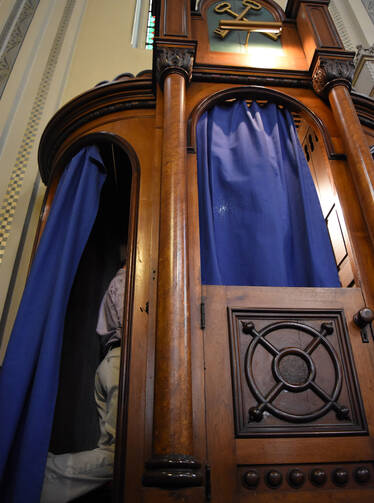SACRAMENTO, Calif. (CNS) -- Under California state Democratic Sen. Jerry Hill's new bill, Catholic priests would be required to report to civil authorities if they learn in confession that a penitent has sexually abused someone.
Current state law, the Child Abuse and Neglect Reporting Act, "makes certain persons, including clergy, mandated reporters." When clergy and other individuals, like therapists -- acting "within their professional capacity, or within the scope of their employment" -- have reason to believe someone is the victim of child abuse or neglect, the law says they are required to report it to the appropriate civil authorities.
This law makes an exception if clergy learn of abuse or neglect "during a penitential communication."
Inserting government into the confessional does nothing to protect children and everything to erode the fundamental constitutional rights and liberties we enjoy as Americans, Steve Pehanich, director of communications and advocacy for the California Catholic Conference, told the Los Angeles Times.
Hill's measure, "Removing Clergy Exemption from Child Abuse and Neglect Reporting," would delete that exception and require clergy to report what they hear in confession as it relates to abuse.
“Inserting government into the confessional does nothing to protect children and everything to erode the fundamental constitutional rights and liberties we enjoy as Americans,” Steve Pehanich, director of communications and advocacy for the California Catholic Conference, told the Los Angeles Times.
Hill said in a statement that there should be "no exceptions, period," claiming that "the exemption for clergy only protects the abuser and places children at further risk."
According to a Fox News report several other states already require priests to report child sexual abuse to law enforcement "no matter how they learn of it": Connecticut, Indiana, Mississippi, Nebraska, New Hampshire, New Jersey, North Carolina, Oklahoma, Rhode Island, Tennessee, Texas and West Virginia.









It's entirely reasonable for priests to repotrt to civil authorities when they learn that someone has been the victim of sexual abuse, even if they learn of the abuse within tye Sacrament of Reconciliation. However, while State Rep. Hall's bill has the best of intentions (to protect children) I oppose the bill. When a penitent confesses her sins to a priest, she has the assurance that her confessed sin (wrongdoing) will remain confidential for all time, even for a mortal sin or criminal offense such as murder or rape. I 'm certainly not a theologian, but it's my understanding that (for instance) if a man confesses to murder, while the priest can't violate the seal of confession and report the crime to the police, he can and I believe is encouraged to withhold absolution. The priest can (and I believe should) urge the person guilty of murder (or whatever crime) to turn herself into the police. Absolution is then withheld for the would -be penitent until she confesses her crime to the police. It's my understanding that each priest has the "right"/ability to tailor his conversation with the confessor (and the penance) according to what he judges to be the most likely effective manner to have tye confessor amend her life. Again, although I go to The Sacrament of Reconciliation each month, I'm no expert on the rubrics of the sacrament. With due respect to the authority of tye Pope and bishops, I believe that it should be mandatory for priests to withhold absolution if someone confesses to having committed a crime. First, The priest would emphasize the legal mandate to confess a murder, rape, etc., as a means of protecting society by accepting personal responsibility for the crime. Second, the priest should emphasize to the person who confesses their sin/crime the possible moral consequences of not receiving absolution for the sin/crime. This could mean the loss of heaven. Finally, as a Catholic who's gay and have confessed in the Sacrament of Reconciliation to having had sex with men, I felt assured that my disclosure to the priest would always be kept confidential. Frankly, I seriously doubt that I would have made my confession if I feared that the priest would have publicly announced my sin. I would have been seriously ashamed if "everyone" knew that I had had sex with men years ago. I believe that the seal of confession, as important and necessary as it is for reasons of religion, also serves people by providing them with someone that they can trust with their secrets. Finally, the priest, if he does what I believe he's morally bound to do and withholds absolution from an unrepentant sinner, and urges the sinner/criminal to turn himself into the police, is also serving the good of society.